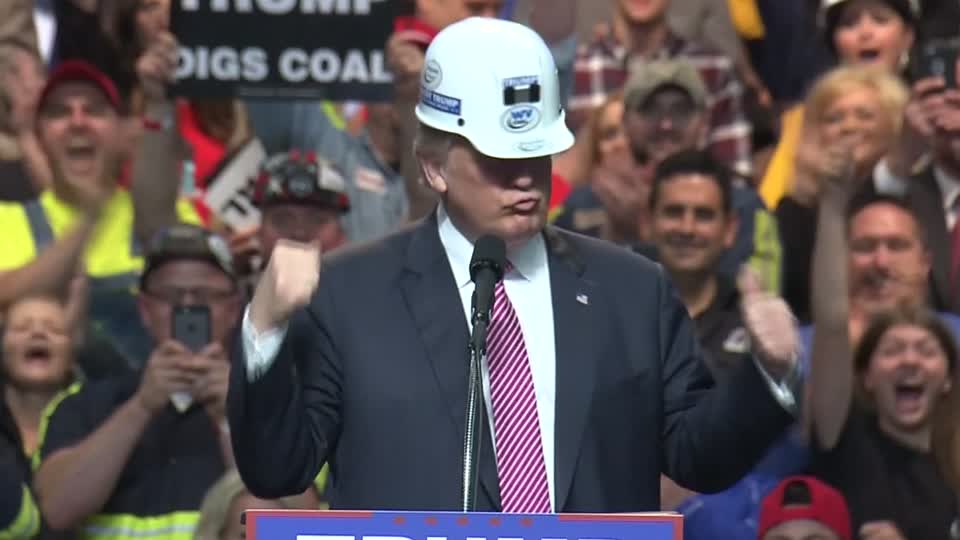Democrats need to admit Trump is boosting the economy

The Trump tax cuts might not end well, since they’re likely to push interest rates higher than they’d otherwise go, possibly fueling inflation. And the extra debt Uncle Sam is taking on to finance the cuts only adds to the burden on future taxpayers.
But for now, the tax cuts seem to be having the intended effect—they’re boosting corporate earnings, stoking investment and, in some cases, trickling down to ordinary workers. Stocks keep hitting new record highs, confidence is rising and nobody sees a recession on the horizon.
Democrats in Washington seem to think they’re sailing into major gains in the 2018 midterm elections, with a good chance to take control of the House of Representatives, and an outside chance of taking the Senate. This may be delusional. It’s not easy to move the needle on the economy, and Trump, for all his bellicose Machiavellianism, is doing it. The economy could be peaking, in fact, just as voters go to the polls in November.
Nearly 100 companies, including AT&T (T), Apple (AAPL), Boeing (BA) and American Airlines (AAL) have announced raises, bonuses, benefit improvements or new investments in the aftermath of the $1.5 trillion tax cut Trump signed in December. A large majority of Americans will see their paychecks rise this year, as the government changes its withholding tables and taxes take a smaller bite. When Yahoo Finance examined the changes recently, we found that a typical worker earning $60,000 would get back an extra $112 per month, or $1,344 per year.
The tax cuts won’t transform the struggling middle class. Higher earners will get a bigger tax cut, proportionally, than lower earners. And the biggest beneficiaries may be those who own stocks, since stock prices surged in anticipation of the tax cuts, with further gains following the actual enactment of the cuts.
There’s also some showmanship in all those corporate announcements. Some are probably disingenuous, meant to curry favor with Trump or mask bad news happening somewhere else. Walmart, for instance, announced it was raising its minimum wage at the same time it closed 63 warehouse stores and laid off thousands of workers. Some companies may be giving Trump credit for raises that were coming anyway, because they’re necessary to keep workers amid a tight labor market. And some companies may be tossing workers a bone now to inoculate themselves against stock buybacks or dividend hikes coming later this year, which would benefit shareholders rather than employees.
Warming to the tax cuts
Still, the changes occurring in the aftermath of the tax cuts represent real money going to real workers. Goldman Sachs warned recently that “investors may overestimate [earnings] accretion from lower taxes, given much of the benefit will be competed away.” Here’s what Goldman means: Corporations may spend more of the tax windfall raising wages, to keep workers, and cutting prices, to remain competitive. If you’re a shareholder, that’s a bad thing. But if you’re an ordinary person, it’s a good thing, because more of the tax savings than expected would benefit workers and consumers.
This comes as the job market is strengthening, labor shortages are developing and larger wage gains seem likely. Moody’s Analytics predicts the unemployment rate will fall from 4.1% now to 3.5% this year, which would be the lowest level since 1969. That should finally push wages up in ways workers will feel, with 2018 being “an inflection point for wage growth,” Moody’s Analytics says. The forecasting firm expects wage growth of 3.5% in 2019, which would be the best since the boom year of 2005.
Not all of that stems from the Trump tax cuts, but presidents generally get credit (or blame) for what the economy does on their watch. Recent polls show Americans are warming, for instance, to the Trump tax cuts, which were unpopular when Trump signed them in late December. The approval rate has risen from 37% then to 46% in the latest New York Times poll, and it could rise further as voters realize the tax cuts won’t trigger Armageddon (not now, anyway) and could actually help the majority of people this year and next. By a lot? No. But it’s better than what many voters think they’ve gotten from Washington lately.
The tax cuts will probably never produce the trickle-down windfall some Republicans promised. But they don’t really have to, if people feel like they end up better off. It’s likely the tax cuts will worsen income inequality, but we won’t know that for a while. Meanwhile, voters will vote this coming November based on whether they feel better off under Trump, or not.
Trump is obviously unpopular, with a dismal approval rating that’s almost unbelievably low given record stock prices and a strong job market. But Democrats would be foolish to think simply running against Trump will produce victory in November. Pocketbook issues almost always dominate elections, and with good times returning, voters simply won’t believe Democrats who say the Trump economy is terrible. In reality, it’s not terrible. It’s pretty good and getting better.
Democrats might still have a compelling message this year if they run on restoring dignity to government, or bolstering women, or fixing the broken health care system, or reinstating environmental protections. But the economy will not be their issue in 2018, and Democrats claiming the Trump economy stinks will seem as out-of-touch as all the other politicians Trump has already defeated.
Confidential tip line: [email protected]. Encrypted communication available.
Read more:
Rick Newman is the author of four books, including Rebounders: How Winners Pivot from Setback to Success. Follow him on Twitter: @rickjnewman
Follow Yahoo Finance on Facebook, Twitter, Instagram, and LinkedIn

 Yahoo Finance
Yahoo Finance 